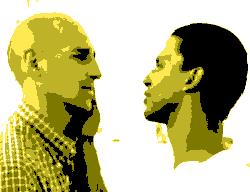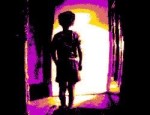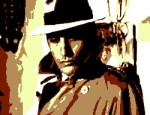Film Review
Drôle de Félix is a comparatively rare example of a gay film which
appeals to a mainstream audience and which, for the main part, manages to avoid the traditional
gay stereotypes. Whereas most films in recent years about gay characters are predominantly
doom-laden affairs weighed down by the spectre of AIDS,
Drôle de Félix
is almost the complete opposite. This film's main character is sure enough
HIV positive who has to consume a daily diet of drugs to stay alive, but this is presented
in a matter-of-fact, almost light-hearted manner, not in the fatalistic tone that is more
familiar to film-goers. As it turns out, Félix's illness is just about the
least important element of the film, and the fact that he is gay is almost as irrelevant.
The film could equally have been made with a straight man - or woman for that matter -
as the lead character.
As road movies go, this is a pretty impressive attempt. As in most films of this
genre, the story is less about a search for a thing or person (in this case for a missing
father), but more about a search for one's personal identity. As the old woman Mathilde
(played magnificently by the former singer Patachou) points out, Félix's search
for his father is merely an excuse. The film is ambiguous as what Félix is
actually looking for, although the spectator can make his or own conclusions from the
various liaisons he makes in his journey across France.
The most enjoyable thing about this film is the quality of the interactions between Félix
and the people he befriends. The dialogue is good, with some deliciously crisp humour
in places, and the performances are equally impressive. Sami Bouajila, who plays
the lead character Félix, holds the film together very well and shows genuine talent
in what is an emotionally demanding role.
The film is not without its faults, however. Primarily, it is marred by its overly-enthusiastic
attempts to attract a gay market. The most blatant example of this is the "
Ma
cousin" segment of the film where Félix hitches a lift from another gay man
with whom he shares a moment of unbridled passion (in an open field). Not only does
this weaken the character of Félix (who had previously curtailed a romantic liaison
with a teenager), but it resorts to the tired stereotype that all gay men are hedonists
who will take off with anything they can find. Mercifully, this segment is short,
but the film would have benefited if it had been cut completely.
Another area where the film is weak is in its handling of the race issue. The film
uses the fact that Félix is half-Arab to illustrate the problem of racism in France,
but it does so in a half-hearted and clumsy fashion. "White skin-headed bigots beat
up Arabs in France" is just about all the film is capable of saying. This
is another strand which should either have been developed more fully or else ignored.
In spite of these flaws,
Drôle de Félix is an engaging film which,
unusually, treats its central gay character with respect and sympathy. Strong acting
performances and a good script, with some beautiful photography of the French countryside,
make it a memorable, contemplative film.
The film's directors - Olivier Ducastel and Jacques Martineau - followed it up
with an even quirkier offering,
Crustacés et coquillages (2005).
© James Travers 2001
The above content is owned by frenchfilms.org and must not be copied.
Film Synopsis
Félix is a HIV-positive gay man of mixed race who lives in the northern French
town of Dieppe with his partner, Daniel. His mother has recently died and he has
just been made redundant. In spite of this, he remains optimistic and decides to
make a pilgrimage to the south of France to try to track down his missing father.
Hitch-hiking from Dieppe to Marseilles he meets a series of people who have a marked affect
on him. These include a gay adolescent looking for his first date, a lonely old
woman who needs someone to rearrange the furniture in her house, a single mother who spends
most of her time ferrying her three young children between their respective fathers, amongst
others.
© James Travers
The above content is owned by frenchfilms.org and must not be copied.



